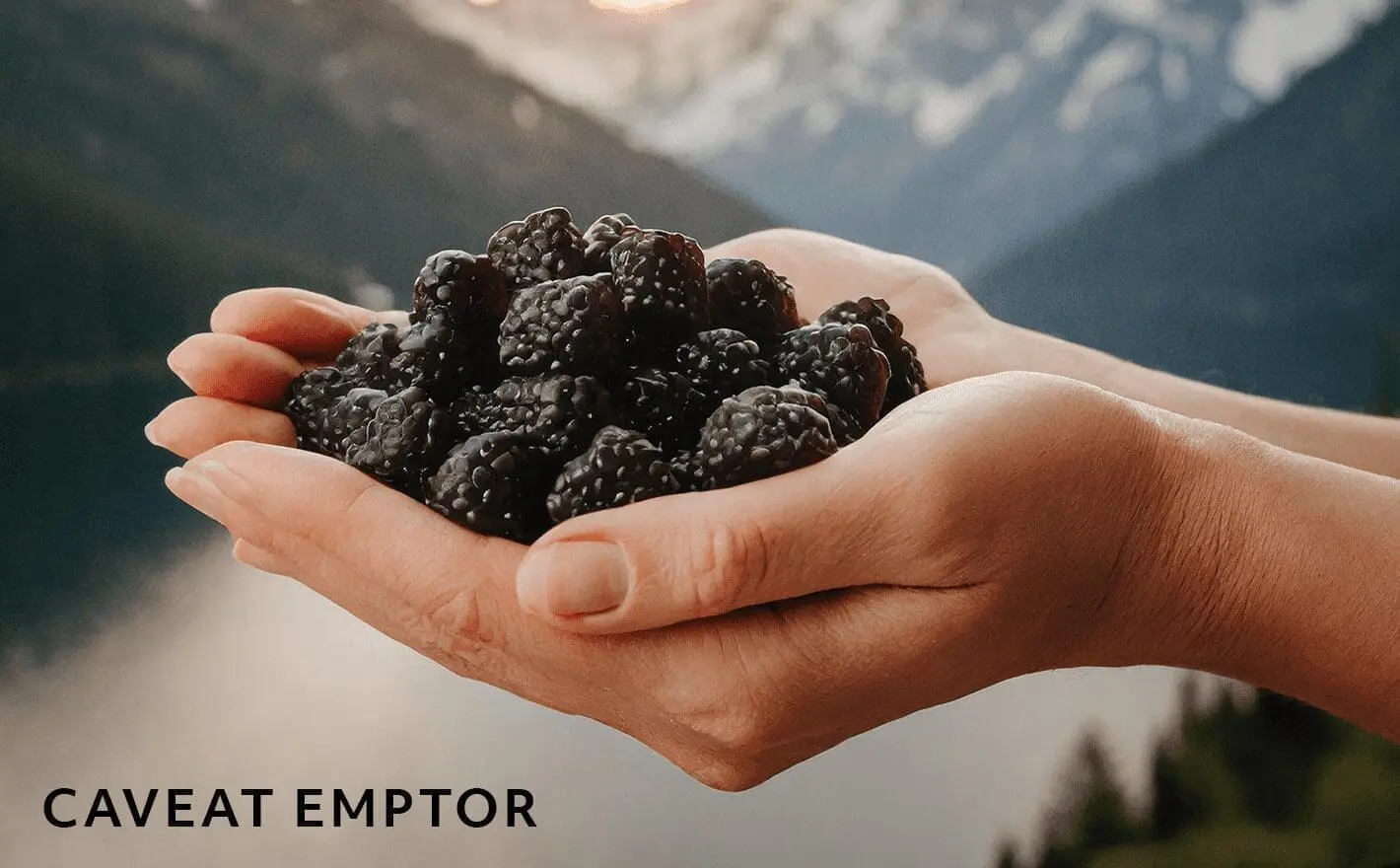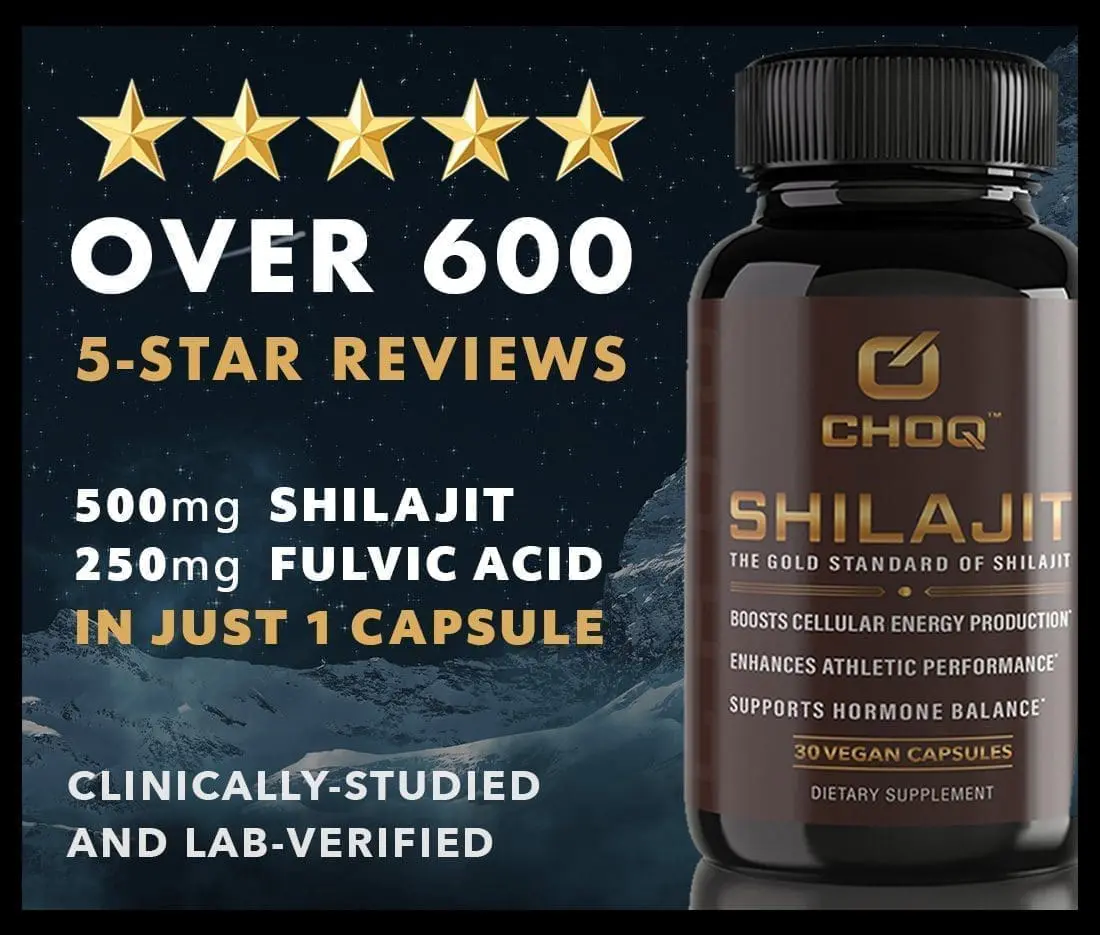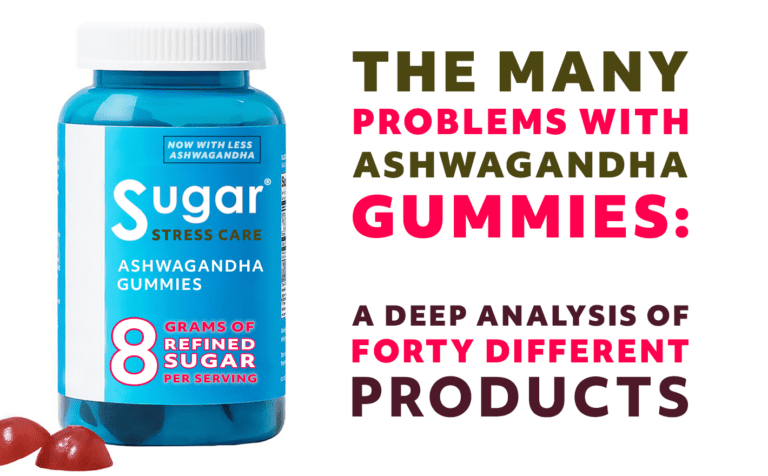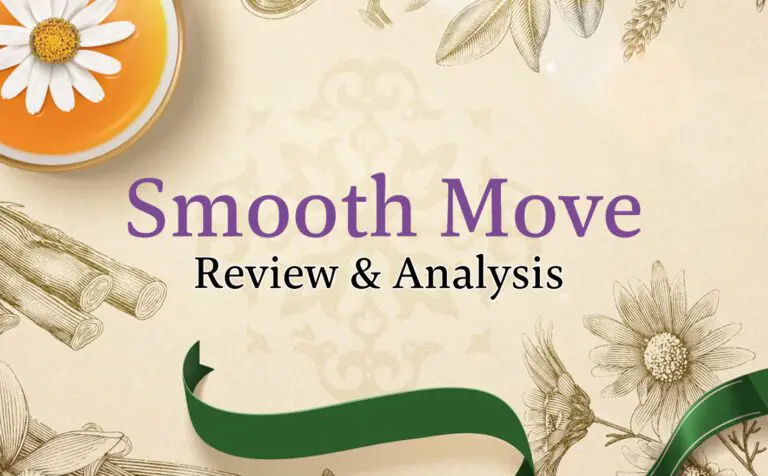There are dozens of different brands of Shilajit gummies, but how can you tell which are the best quality? What are the pros and cons of gummies versus capsules or powders? And how much sugar is in these things?
We performed an in-depth review of 50 different brands of Shilajit gummies, plugged a HUGE amount of information into a spreadsheet, then sifted through a mountain of data to give you the most functional and fact-based assessment possible.
In our opinion, the cost-to-benefit ratio doesn’t favor gummies over capsules or powders. When you choose a gummy, you’re typically getting less Shilajit for more money–not to mention sugar, suspect flavor chemicals, and a bunch of other extraneous ingredients you could easily avoid.
That being said, if you do decide to buy Shilajit gummies, this article will help you identify the highest quality ones and avoid getting ripped off.
Here’s a quick summary of our analysis, with links to each section:
- The price per gram of Shilajit varied by a whopping 9,400% (from about 40 cents up to almost $37)
- 38% of gummies violated FDA regulations by grossly misrepresenting the amount of Shilajit
- Two-thirds had major transparency issues with their label or product page
- Sugar content ranged from 1-6 grams per serving (with an average of 2.5 grams)
- Only 2/50 products used a Shilajit backed by clinical research (like the kind that’s in CHOQ Shilajit & CHOQ Daily)
- Conclusion: what to look for in a high-quality Shilajit gummy
Shilajit gummy pricing analysis
It can be hard to be a supplement consumer, given that so many companies are blatantly dishonest about their products. A common tactic these unsrcupulous brands use is to alter their numbers in clever, misleading ways so it takes more time for you to calculate how much is really in each serving. After you run the real numbers, you’ll quickly realize that there are tons of Shilajit gummies out there that seem like they’re a great deal, but turn out to be a huge ripoff.
For example, let’s say that there’s a Shilajit gummy that costs only $20 for a one month supply, and it’s got a really slick label, plus there are even a couple extra ingredients like B vitamins and maybe a little magnesium. Compared to some of the other Shilajits that cost over twice that amount, it might seem like a great deal.
But when you look at what’s actually under the hood–so to speak–you find that you’re only getting 1/10th the amount of Shilajit that’s in a $40 product, plus the amounts of the added vitamins and minerals are often so low that their cost is negligible.
Shopping for supplements is a lot like buying wine. Unless you really know your stuff, it’s extremely hard to evaluate the true quality of a product. Companies know that most people aren’t expert-level connoisseurs and they even make their labels more confusing on purpose.
One way that some manufacturers do this is by using proprietary blends, where they don’t disclose the amounts of all the active ingredients. CHOQ has some of the highest quality and transparency standards in the industry, so we always tell you the exact doses in every product (click here to learn more about why we think proprietary blends should be illegal).
After we plugged all the doses and prices of these gummies into our spreadsheet and calculated everything in terms of dollars per gram of Shilajit, we found some pretty shocking results:
- The cheapest one came out to $0.39 per gram of Shilajit
- The most expensive one came out to $36.67 per gram of Shilajit
- Therefore, these products vary by a whopping 9,400%!
Imagine if you were shopping for toilet paper and the roughest, most generic brand was $5 a pack, but the fanciest, most luxurious brand was $470! You’d be utterly shocked that any company would charge that much. That’s exactly what’s happening with Shilajit gummies.
What’s more is that many of these companies are actually violating FDA regulations by misrepresenting about how much Shilajit is actually in these gummies…
Over one third of Shilajit gummies are lying about how much Shilajit they contain
This is a particularly disturbing trend we’ve noticed in recent years. Companies increasingly list the pre-extraction amount of an ingredient instead of the actual amount, making it seem like a product has 10, 20, or even 30x more than it really does.
Here’s an example from a real product we found:
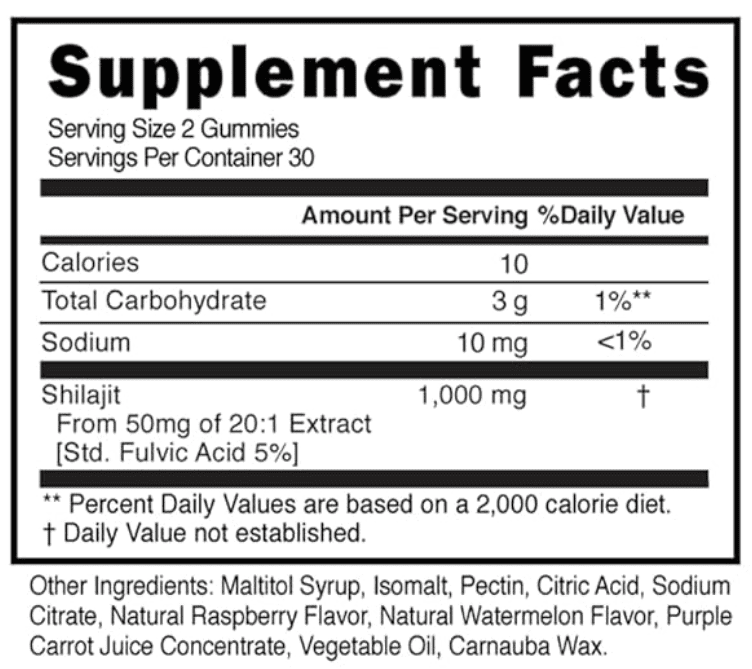
It looks like there’s 1,000 mg of Shilajit in this product, but there’s really only 50 mg. The idea (which is totally wrong) is that they’re taking 1,000 mg of Shilajit and concentrating it down so that it’s 20 times as potent. As you can see above, they call this a ‘20:1 extract’.
While the concept of extract ratios does have some reality to it, it doesn’t mean what they want you to think it does. The assumption is that the final product must have 20x as much of all the important stuff in it, but that’s not the reality at all. The only number that really matters–and can be verified with labs–is the percentage of fulvic acid (the most important active compound in Shilajit).
Notice how the label says ‘Std. Fulvic Acid 5%’ (‘Std’ means ‘Standardized’). That’s an extremely low amount of fulvic acid. In fact it’s 90% less than what’s in CHOQ Shilajit, which is lab-verified to contain a minimum of 50%.
When you run the numbers, it’s pretty mind blowing:
- CHOQ Shilajit has a minimum of 250 mg of fulvic acid per 500 mg serving
- This gummy has a minimum of 2.5 mg of fulvic acid per serving
- Thus, our product has literally 100x as much of this essential active compound
Shockingly, 38% of the Shilajit gummies we analyzed used this extremely deceptive, likely illegal labeling tactic. Even more of them had other major issues, though…
Two-thirds of Shilajit gummies had major transparency issues with their labels or product pages
There are lots of supplements sold online (especially Amazon) that have transparency and legality issues, but Shilajit gummies are among some of the worst offenders.
For this review, we divided what we found into two categories: minor and major. In order to be put in a certain category, each product only needed to have one of the issues listed on the graphic below, but many of them had 3 or more. <
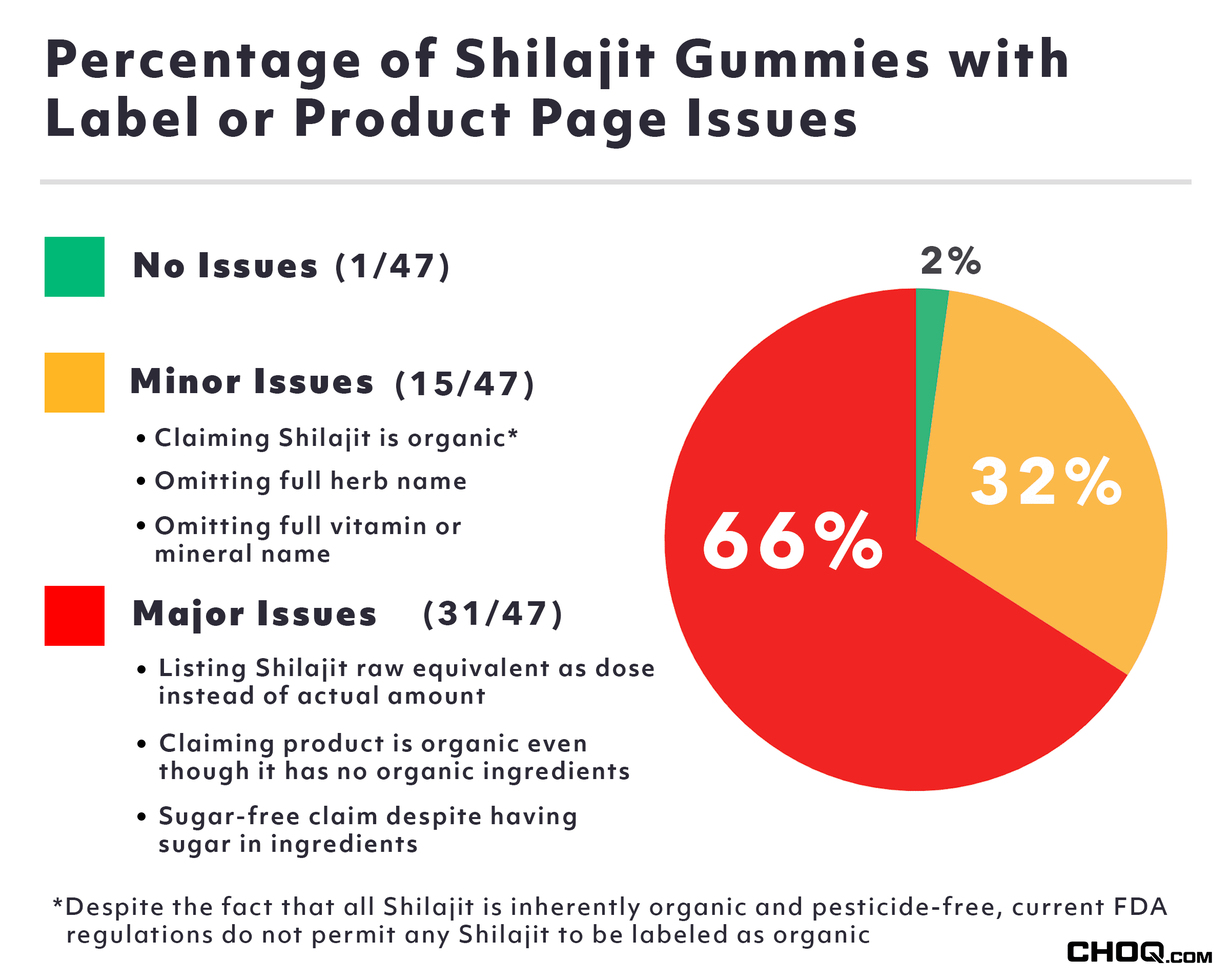
(Note that only 47 out of 50 products were included because 3 of them didn’t show enough of the label for it to be analyzed)
Also, a number of products said the product as a whole was organic, but had actually had zero organic ingredients! But that wasn’t even the worst problem we found….
Sugar quantity & widespread mislabeling of sweeteners in Shilajit gummies
Another major transparency issue we found was how some products claim to be sugar-free, but then actually list sugar (EVEN CORN SYRUP!) as one of the first ingredients.
Check out this example from a real product we found on Amazon:
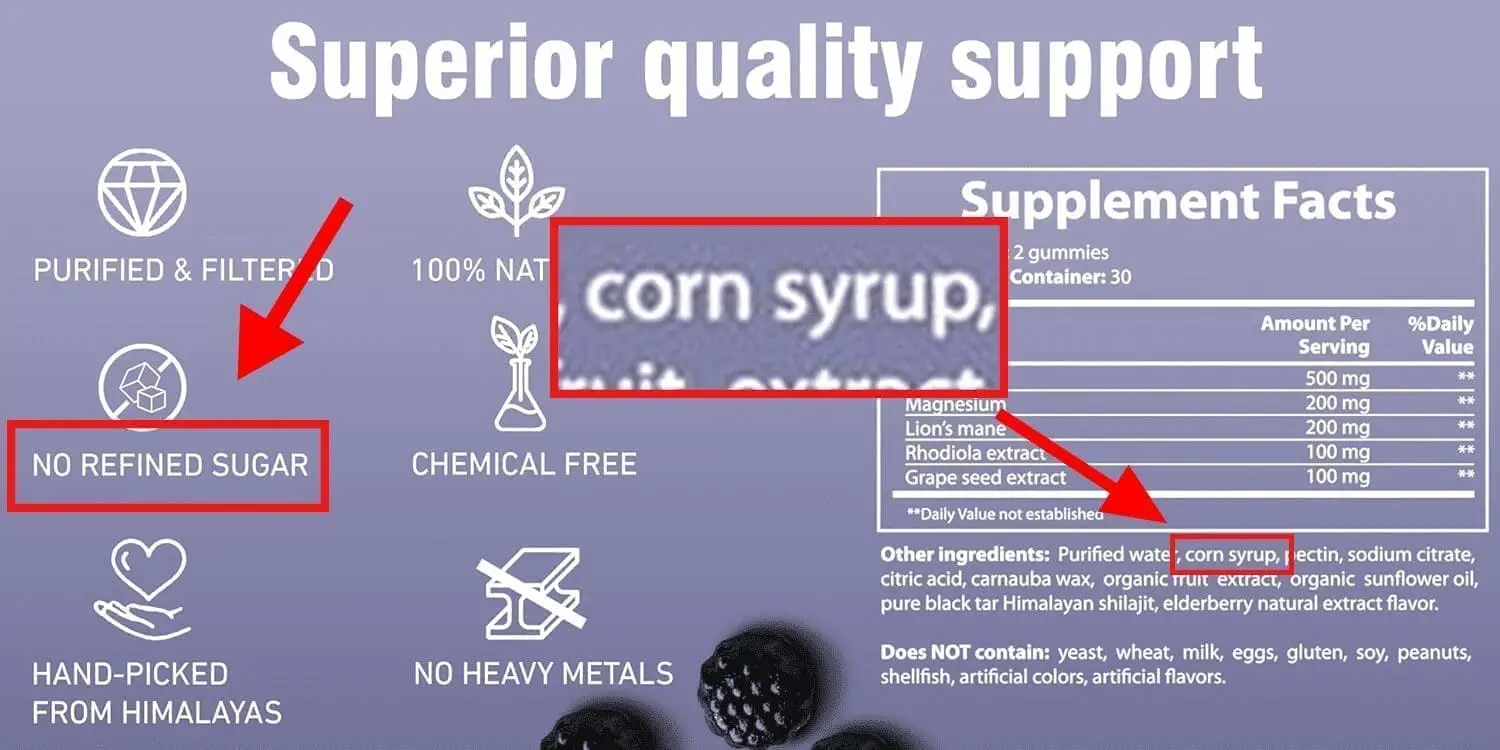
If a company is making this big of a mistake in their own graphics, we shudder to think what might be going on behind closed doors where it’s being made. If you’re shopping online and you see a product with this kind of error on its label, never buy anything that company makes!
Here are some stats on sugar in the 50 Shilajit gummies we reviewed:
- About a quarter were sugar-free, with most of those using sweeteners like stevia or sugar alcohols like xylitol (we don’t use xylitol because it doesn’t meet the CHOQ Standard and may be problematic for your heart according to recent research)
- Almost 30% of Shilajit gummies used either corn syrup or glucose syrup, both of which almost always come from GMO sources
- Sugar per serving ranged from 1 to 6 grams, with an average of 2.5 grams
While 2.5 grams isn’t necessarily a huge amount of sugar, it’s important to think about sugar-to-Shilajit ratio. For example, if you’re taking a product that has that much sugar but only 50 mg of Shilajit per serving, that means you’d have to eat nearly an ounce of sugar to get the same amount of Shilajit that’s in just a single capsule of CHOQ.
48 out of 50 gummies used generic Shilajit not backed by clinical research
CHOQ’s customers are well-educated about supplements and care more than most about what they put in their bodies.
If you count yourself among the extra savvy like those in CHOQ Nation, then you’ll love this pro tip: always check to see if the main ingredient is generic or proprietary. If it’s proprietary, it will have either a ™ or a ® after its name on the supplement facts panel.
There’s a big difference between these two kinds of ingredients. The proprietary Shilajit we use in both CHOQ Shilajit and CHOQ Daily not only uses a patented extraction method, but is also standardized to contain at least 50% fulvic acid and even has 8 different studies showing its specific benefits.
Proprietary ingredients are far more expensive than generics because the companies who make them spend millions of dollars to patent them and do their own clinical research. These ingredients are made to much higher specifications, generally undergo higher quality labs, and almost always come from cleaner sources.
We’re incredibly picky about sourcing and always go out of our way to find the ingredients with the most research behind them, made to the highest specs. We took a look at how much cheap, generic Shilajit powder costs compared to the proprietary one in CHOQ products and are proud to say that we pay up to 20x as much for our clinically-studied, pristinely-sourced Shilajit. What’s more is that our retail price per dose is actually less than many of these sugar-laden gummies.
If you really want to buy Shilajit gummies, here’s how to do it
As we said in the beginning, we really can’t recommend anyone buy Shilajit gummies. Even if you buy another brand that’s not CHOQ, we still think you’re better off buying capsules or powders because that way you’re at least not paying extra just to get a bunch of sugar, preservatives, and suspect flavor chemicals.
If you do still want to buy Shilajit gummies though, here’s what to look for:
- Look for at least 500 mg of Shilajit per serving
- Avoid anything with natural flavors
- Check the label to make sure they’re disclosing the real amount of Shilajit extract and not the pre-extract amount
- Watch out for corn syrup, glucose syrup, or other GMO-corn-based sugars
- Buy from a brand that’s not exclusively on Amazon (these are always the lowest quality)
- Ignore all the claims about their Shilajit being a 10:1, 20:1 extract, etc (these are essentially meaningless; fulvic acid % is what counts)
As mentioned previously, CHOQ has some of the highest quality and transparency standards in the supplement industry. We use full-disclosure labeling and always tell you exactly how much of every active ingredient you’re getting. Based on potency and ingredient quality, literally none of the Shilajit gummies we reviewed would meet the CHOQ Standard.
Here’s a list of all the things we don’t allow in our products:
- Artificial sweeteners, flavors, dyes, or preservatives
- >Generic, non-standardized Shilajit that hasn’t been tested for Fulvic Acid
- So-called ‘natural flavors’ (which are filled with synthetic chemicals)
- >Genetically Modified Organisms (GMOs) of any kind
- >Low-quality vitamins & minerals like folic acid and magnesium oxide
- Trashy excipients like magnesium stearate and croscarmellose
We also go out of our way to use ingredients backed by proprietary clinical research. CHOQ Shilajit and CHOQ Daily both contain 500 mg per serving, which is the exact dose that was used in the studies that showed benefits for hormone health, energy, collagen production, and more.
In the Wild West of the supplement industry, it’s crucial to educate yourself and stay abreast of all the tricks that low-quality brands use to deceive you. If you’d like to learn more about supplement quality and transparency, be sure to follow our blog (sign up at the bottom of the page and receive 15% off any subscription for life).
